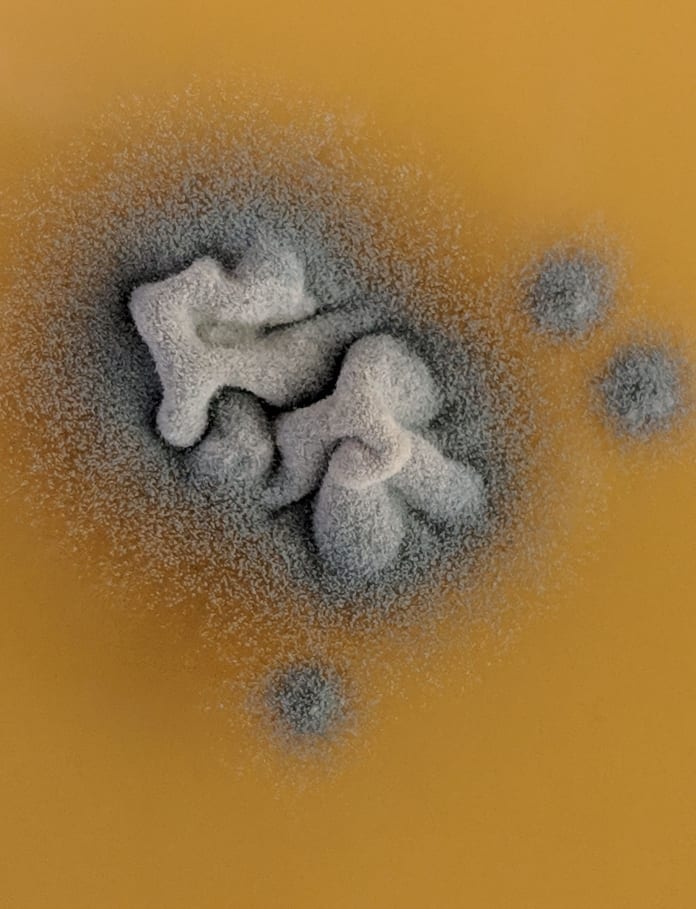Ground-breaking work by university experts in Tennessee, Texas and Swansea is helping develop a better understanding of the growing threat posed by antifungal drug resistance.
Invasive aspergillosis is a devastating disease caused by breathing in small airborne spores of the fungus Aspergillus fumigatus and it is a condition where drug resistance has been encountered.
In a healthy person these spores are destroyed by the body’s immune system but in those with a weakened immune system – such as following organ transplantion or in someone with a lung condition such as asthma or cystic fibrosis – they can trigger a range of problems including infections.
Every year aspergillosis leads to more than 200,000 life-threatening infections and increasingly resistance to vital antifungal drug treatments makes those infections harder to treat.
National Institutes of Health (USA) funding supported a collaboration between the University of Tennessee, the University of Texas and Swansea University as part of a $2 million, five-year research programme. This support enabled investigation of resistance to the triazole class of antifungal drugs used for treating the disease
A new paper, published in the prestigious American Microbiology Society journal mBio, reveals how researchers have been able to identify a previously uncharacterised genetic mutation in clinical isolates that leads to resistance.
Professor Jarrod Fortwendel, from the University of Tennessee, said: “As with bacteria, antifungal drug resistance is a real challenge facing medicine.
“Understanding how the fungus becomes drug resistant is important for designing changes in therapy to overcome aspergillosis.”
Professor Dave Rogers, also from the University of Tennessee, added: “It is very important that the research continues and we find out more about why it is happening and how we can tackle it for the future.”
Swansea University’s Professor Steve Kelly, whose experience researching the field of antifungal resistance dates back to 1984, described the findings as a real breakthrough.
He said: “This paper is the result of a lot of hard work and we are delighted to now be able to publish our findings.”
The paper Mutations in hmg1, challenging the paradigm of clinical triazole resistance in Aspergillus fumigatus is published in mBio. Its authors are Jarrod R Fortwendel, P David Rogers, Jeffrey MRybak and WenboGe, from the University of Tennessee and Nathan P Weiderhold, University of Texas. Swansea University authors are Steven Kelly and Josie Parker.
Torri tir newydd gan ymchwilwyr sy’n mynd i’r afael â her ymwrthedd gwrthffyngol
Mae gwaith arloesol gan arbenigwyr prifysgolion Tennessee,Texas a Abertawe y helpu i ddatblygu dealltwriaeth well o’r bygythiad cynyddol gan ymwrthedd gwrthffyngol cyffuriau.
Mae aspergilws ymledol yn glefyd distrywiol sy’n cael ei achosi gan anadlu sborau bach y ffwng Aspergillus fumigatus ac mae’n gyflwr lle mae ymwrthedd i gyffuriau wedi bod yn broblem.
Mewn unigolyn iach, caiff y sborau hyn eu dinistrio gan system imiwnedd y corff ond yn y rhai hynny sydd â system imiwnedd wanach, megis yn dilyn trawsblaniad organ neu unigolyn sy’n dioddef o gyflwr yr ysgyfaint megis asthma neu ffibrosis cystig, gall sbarduno amrywiaeth o broblemau, gan gynnwys heintiau.
Bob blwyddyn, mae aspergilws yn arwain at fwy na 200,000 o afiechydon sy’n bygwth bywyd, ac mae ymwrthedd cynyddol i driniaeth gan gyffuriau gwrthffyngol hanfodol yn gwneud yr heintiau hynny’n anos i’w trin.
Bu cyllid gan Sefydliadau Cenedlaethol Iechyd (UDA) yn gymorth i waith cydweithredol rhwng Prifysgol Tennessee, Prifysgol Texas a Phrifysgol Abertawe fel rhan o raglen ymchwil pum mlynedd gwerth $2 miliwn. Galluogodd y cymorth hwn ymchwil i ymwrthedd i’r dosbarth trïasol o gyffuriau gwrthffyngol a ddefnyddir i drin y clefyd.
Mae papur newydd, a gyhoeddwyd yng nghyfnodolyn breintiedig Cymdeithas Microbioleg America, mBio, yn datgelu sut mae ymchwilwyr wedi gallu nodi mwtaniadau genetig nas nodweddwyd o’r blaen mewn unigion clinigol sy’n arwain at ymwrthedd.
Meddai’r Athro JarrodFortwendel o Brifysgol Tennessee:“Fel bacteria, mae ymwrthedd i gyffuriau gwrthffyngol yn her ddifrifol y mae meddygaeth yn ei hwynebu.”
“Mae deall sut mae’r ffwng yn troi’n ymwythiannol yn bwysig er mwyn dylunio newidiadau mewn therapi i oresgyn aspergilws.”
Ychwanegodd yr Athro Dave Rogers, sydd hefyd o Brifysgol Tennessee:“Mae’n bwysig iawn bod yr ymchwil yn parhau a’n bod yn darganfod mwy am pam mae’n digwydd a sut gallwn fynd i’r afael ag ef yn y dyfodol.”
Disgrifiodd yr Athro Steve Kelly o Brifysgol Abertawe, y mae ei brofiad ym maes ymwrthedd gwrthffyngol yn dyddio’n ôl i 1984, y canfyddiadau fel torri tir newydd sylweddol.
Meddai:“Mae’r papur hwn yn ffrwyth llawer o waith caled ac rydym wrth ein boddau i allu cyhoeddi ein canfyddiadau nawr.”
Mae’rpapurMutations in hmg1, challenging the paradigm of clinical triazole resistance in Aspergillus fumigatuswedieigyhoeddiynmBio. Eiawduronyw Jarrod R Fortwendel, P David Rogers, Jeffrey MRybak a WenboGe, o Brifysgol Tennessee a Nathan P Weiderhold, Prifysgol Texas.AwduronPrifysgolAbertaweyw Steven Kelly a Josie Parker.
Help keep news FREE for our readers
Supporting your local community newspaper/online news outlet is crucial now more than ever. If you believe in independent journalism, then consider making a valuable contribution by making a one-time or monthly donation. We operate in rural areas where providing unbiased news can be challenging. Read More About Supporting The West Wales Chronicle























